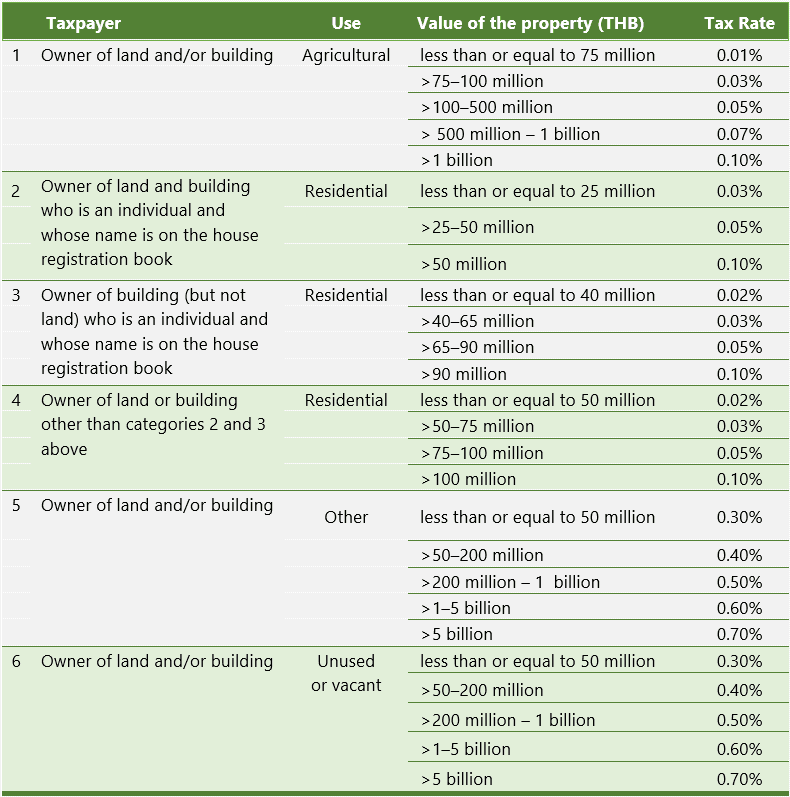
admin
1 year ago

Land and buildings tax is a form of property tax imposed on owners of land and buildings in Thailand. The tax is based on the assessed value of the property and is collected by the local authorities.
The purpose of the land and buildings tax is to generate revenue for the government and to promote equitable distribution of wealth. It is an important source of income for local administrations and contributes to the development and maintenance of public infrastructure and services.
Property owners are required to pay the land and buildings tax annually, and failure to do so can result in penalties or legal consequences. Understanding the key aspects of this tax is crucial for property owners in Thailand to fulfill their obligations and avoid any potential issues.

In Thailand, the liability to pay land and building tax falls on the property owners. Whether you own a piece of land or a building, you are responsible for fulfilling your tax obligations.
It is important to note that the liability may vary depending on the type of property and its use. For example, if you own a residential property, the tax liability may be different from that of a commercial property or an agricultural land.
Property owners should consult with tax authorities or seek professional advice to understand their specific tax liabilities and ensure compliance with the land tax and building tax regulations in Thailand.
While land and buildings tax is generally applicable to all properties in Thailand, there are certain exemptions available under specific circumstances.
For example, properties owned by government agencies, religious institutions, and certain charitable organizations may be exempt from tax collection. Additionally, properties used for agricultural purposes or owned by small-scale farmers may also be eligible for exemptions.
It is important for property owners to be aware of these exemptions and to understand the eligibility criteria. Consulting with tax authorities or seeking professional advice can help property owners determine if their property qualifies for any exemptions under the land and buildings tax in Thailand regulations.
The tax base for land and buildings tax in Thailand is determined based on the assessed value of the property. The assessed value is calculated by the local authorities and may take into consideration factors such as the size, location, and intended use of the property.
Property owners should be aware of the factors that can affect the assessed value of their property and ensure its accuracy. In case of any discrepancies or concerns, property owners can contact the tax authorities for clarification or seek professional assistance.
Understanding the tax base is important for property owners to accurately determine their tax liabilities and ensure compliance with the land tax and building tax regulations.

There are certain exemptions available under the land and buildings tax regulations in Thailand. These exemptions can vary depending on factors such as the type of property, its use, and the owner's circumstances.
For example, properties used for agricultural purposes or owned by small-scale farmers may be eligible for exemptions. Additionally, properties owned by government agencies, religious institutions, and certain charitable organizations may also be exempt from tax collection.
It is important for property owners to understand the eligibility criteria for these exemptions and to ensure compliance with the relevant regulations. Consulting with tax authorities or seeking professional advice can help property owners determine if their property qualifies for any exemptions under the land and building tax system.
The land and building tax in Thailand is due annually. The specific due date may vary depending on the local regulations and the tax year.
Property owners should be aware of the due date for their tax payment and ensure timely compliance. Failure to pay the tax by the due date may result in penalties or legal consequences.
It is advisable for property owners to maintain a record of the tax due dates and set reminders to ensure timely payments and avoid any unnecessary complications.
The land and building tax in Thailand can be paid at designated locations determined by the local authorities. These locations may include government offices, tax collection centers, or online platforms.
Property owners should check with the tax authorities or refer to the official guidelines to determine the specific payment options available in their area. It is important to follow the prescribed procedures and deadlines for tax payment to ensure compliance and avoid any penalties or legal issues.
In case of any difficulties or queries regarding the payment process, property owners can contact the tax authorities for assistance or seek professional advice.
Property owners in Thailand should be aware of the penalties for late tax payment to avoid any financial or legal consequences. If the tax is not paid by the due date, penalties may be imposed based on the amount of tax owed and the duration of the delay.
These penalties can be significant and may include additional fees, interest charges, or even legal action. It is important for property owners to prioritize timely tax payments to avoid any unnecessary financial burdens or legal complications.
In case of any difficulties or challenges in making the tax payment on time, property owners should contact the tax authorities or seek professional assistance to explore potential solutions and avoid any negative consequences.
The fixed maximum rates for land tax and building tax play a significant role in determining the tax liability of property owners in Thailand. These rates are set based on the assessed value of the property and are subject to periodic revisions by the tax authorities.
It is important for property owners to understand these rates and how they are calculated to ensure accurate tax payments. The rates may vary depending on factors such as the type of property, its location, and its intended use. Property owners should consult with tax authorities or seek professional advice to determine the specific rates applicable to their property.
Compliance with the fixed maximum rates is essential to avoid any penalties or legal issues related to underpayment or non-payment of the land and building tax in Thailand.


The transition period rates are an important aspect of the land and building tax system in Thailand. During this period, the rates for the tax are fixed based on the assessed value of the property. It is essential for property owners to understand these rates and their implications to ensure compliance with the tax regulations.
Another important point to note about transition period rates is that they may vary depending on the type of property and its location. Property owners should consult with tax authorities or seek professional advice to determine the specific rates applicable to their property.
Overall, being aware of the transition period rates is crucial for property owners in Thailand to ensure they meet their tax obligations and avoid any penalties or legal issues.

Some Of Previous Articles:
(Thailand Property Market Outlook)
Information and statistics for This Post Provided by Yoohoo Homes.